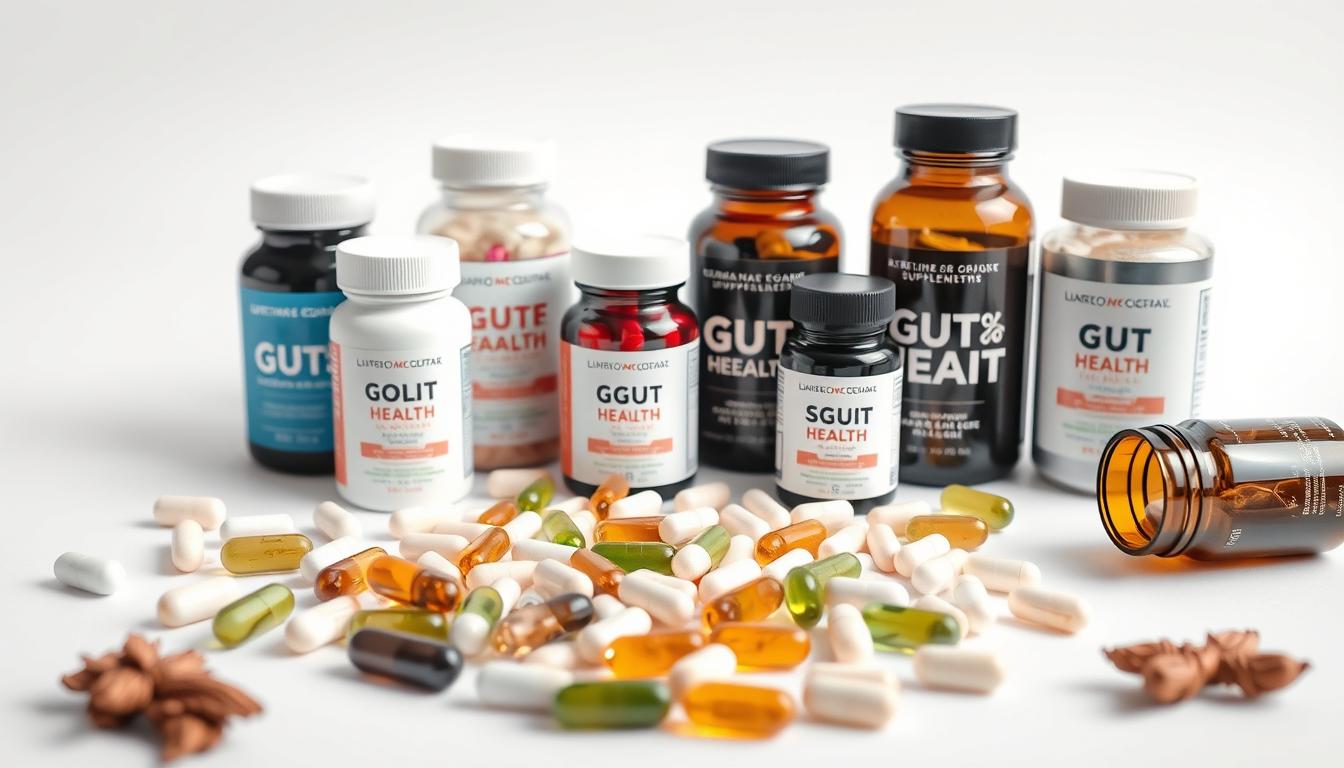Are you aware of the crucial role your gut plays in your overall well-being? A healthy gut is essential for a strong immune system, proper digestion, and even mental clarity. But what happens when your gut is out of balance?
Maintaining a balanced gut microbiome is vital, and while diet and lifestyle changes are fundamental, certain supplements can provide additional support. The right supplements can help foster a healthy gut, enhancing your overall health.
Understanding the importance of gut health and the benefits of supplements can be a game-changer. Let’s explore how the right supplements can support your gut health.
Key Takeaways
- Supplements can play a crucial role in supporting gut health.
- A balanced gut microbiome is essential for overall well-being.
- The right supplements can enhance digestion and immune function.
- Gut health is linked to mental clarity and overall health.
- Diet and lifestyle changes are fundamental to maintaining gut health.
Understanding Gut Health and Its Impact on Overall Wellness
The gut microbiome, a complex ecosystem of microorganisms, plays a vital role in maintaining our overall health. It is responsible for various functions, including the digestion of food, synthesis of vitamins, and regulation of the immune system.
The Gut Microbiome Ecosystem
The gut microbiome is composed of trillions of microorganisms, including bacteria, viruses, and fungi, that live in a delicate balance. This balance is crucial for maintaining healthy digestion, absorbing nutrients, and preventing the overgrowth of harmful bacteria.
Common Signs of Poor Gut Health
Poor gut health can manifest in various ways, including bloating, abdominal pain, diarrhea, and constipation. Other signs may include fatigue, skin issues, and mood disturbances, highlighting the gut’s connection to overall well-being.
How Supplements Can Support Digestive Balance
Supplements such as probiotics, prebiotics, and digestive enzymes can help restore balance to the gut microbiome. Probiotics introduce beneficial bacteria, while prebiotics provide the necessary fuel for these bacteria to thrive, supporting a healthy digestive system.
| Supplement | Function | Benefits |
|---|---|---|
| Probiotics | Introduce beneficial bacteria | Improved digestion, boosted immune system |
| Prebiotics | Fuel for beneficial bacteria | Enhanced nutrient absorption, healthy gut bacteria |
| Digestive Enzymes | Break down food effectively | Reduced bloating, improved nutrient absorption |
Best Supplements for Gut Health
Gut health is increasingly recognized as a cornerstone of overall health, with specific supplements offering targeted support. The right combination of supplements can help maintain a balanced gut microbiome, improve digestive health, and enhance overall well-being.
Probiotics: Living Beneficial Bacteria
Probiotics are live, beneficial bacteria that are similar to the beneficial microorganisms found in the human gut. They are available in fermented foods and dietary supplements, and can help restore the natural balance of the gut microbiome.
Different Strains and Their Benefits
Different probiotic strains have different benefits. For example, Lactobacillus and Bifidobacterium are two of the most common genera used as probiotics. Each strain can have specific effects on the gut and overall health.
Choosing the Right CFU Count
The CFU (Colony-Forming Units) count indicates the number of viable bacteria in a probiotic supplement. Choosing a product with an appropriate CFU count is crucial for effectiveness. A higher CFU count doesn’t always mean better; it depends on the specific strain and intended benefit.
Prebiotics: Fuel for Good Bacteria
Prebiotics are non-digestible fibers that serve as food for beneficial bacteria in the gut, promoting their growth and activity. Common prebiotic sources include inulin and fructooligosaccharides.
Digestive Enzymes: Breaking Down Food Effectively
Digestive enzymes are proteins that help break down food into smaller molecules that can be absorbed by the body. Supplementing with digestive enzymes can support individuals with enzyme deficiencies or those experiencing digestive discomfort.
L-Glutamine: Supporting Intestinal Lining
L-Glutamine is an amino acid that serves as a fuel source for the cells lining the intestines. It can help maintain the integrity of the intestinal lining and support the healing of leaky gut syndrome.
Collagen Peptides: Repairing Gut Tissue
Collagen peptides are short chains of amino acids that can help repair and heal the gut tissue. They are rich in glycine, proline, and hydroxyproline, which are important for gut health.
Other Beneficial Supplements
In addition to probiotics, prebiotics, and digestive enzymes, other supplements can support gut health. These include zinc for gut barrier function, omega-3 fatty acids for their anti-inflammatory properties, and slippery elm and marshmallow root for their soothing effects on the digestive tract.
Zinc and Gut Barrier Function
Zinc plays a crucial role in maintaining the integrity of the gut barrier. It supports immune function and can help reduce the risk of gut-related disorders.
Omega-3 Fatty Acids
Omega-3 fatty acids, particularly EPA and DHA, have anti-inflammatory properties that can help reduce inflammation in the gut and promote overall health.
Slippery Elm and Marshmallow Root
Slippery elm and marshmallow root are herbal remedies known for their soothing effects on the mucous membranes and digestive tract. They can help alleviate symptoms of digestive discomfort.
How to Select Quality Gut Health Supplements
With numerous gut health supplements available, selecting a high-quality product requires careful consideration. The key to making an informed decision lies in understanding the various factors that contribute to a supplement’s effectiveness and quality.
Reading Labels and Understanding Ingredients
The first step in choosing a quality gut health supplement is to read the label carefully. Look for products that clearly list their ingredients and their quantities. Be wary of proprietary blends that don’t specify the amount of each ingredient. Transparency is key when it comes to supplement labeling. For instance, if you’re considering a probiotic supplement, check that it specifies the strains and the CFU (Colony-Forming Units) count.
Third-Party Testing and Quality Certifications
Third-party testing is crucial for ensuring the quality and purity of gut health supplements. Look for products that have been tested by reputable third-party organizations. Certifications from organizations like NSF International or the National Science Foundation indicate that the product has met certain standards for quality. These certifications can provide peace of mind, knowing that the product you’re using is safe and effective.
Form Factors: Capsules, Powders, and Liquids
Gut health supplements come in various forms, including capsules, powders, and liquids. The choice of form factor depends on personal preference and specific needs. Capsules are convenient and easy to dose, while powders can be mixed into foods or drinks for those who have trouble swallowing pills. Liquids are another option, often providing a more rapid delivery of the active ingredients.
Matching Supplements to Your Specific Digestive Concerns
Different supplements address different digestive concerns. For example, if you’re experiencing bloating and gas, a probiotic or digestive enzyme supplement might be beneficial. For gut lining support, consider supplements containing L-glutamine. Understanding your specific needs is crucial in selecting the right supplement. Consult with a healthcare professional to determine the best natural remedies for your gut health.
By carefully considering these factors, you can make an informed decision when selecting a gut health supplement. Remember, the goal is to support your overall wellness with effective and safe products.
Creating an Effective Gut Health Supplement Routine
Creating a personalized gut health supplement routine involves several key considerations to maximize the benefits of gut healing supplements.
Optimal Timing for Different Supplements
The timing of supplement intake can significantly impact their effectiveness. For instance, probiotics are often best taken on an empty stomach to ensure the beneficial bacteria reach the gut intact. In contrast, digestive enzymes should be taken with meals to aid in food breakdown.
- Take probiotics in the morning before breakfast.
- Consume digestive enzymes with each meal.
- Consider taking L-Glutamine before bed to support intestinal lining repair during sleep.
Potential Interactions and Combinations to Avoid
When combining supplements, it’s essential to be aware of potential interactions. For example, certain antibiotics can negate the effects of probiotics. Always consult with a healthcare professional before starting a new supplement regimen, especially if you’re already taking medications.
Supporting Lifestyle Changes for Maximum Benefit
Supplements work best when complemented by a healthy lifestyle. This includes a balanced diet rich in fiber, adequate hydration, regular exercise, and stress management techniques. A holistic approach enhances the effectiveness of gut healing supplements.
Tracking Progress and Adjusting Your Approach
Monitoring your body’s response to supplements is crucial. Keep a journal to track any changes in symptoms, energy levels, and overall well-being. Based on your observations, you may need to adjust the types or dosages of supplements. Regular check-ins with a healthcare provider can also provide valuable insights.
- Start with a single supplement to isolate its effects.
- Gradually introduce new supplements, monitoring for any adverse reactions.
- Re-evaluate your routine every few months to ensure it remains effective.
Conclusion
Choosing the best supplements for gut health is crucial for supporting overall wellness. By understanding the different types of supplements available, such as probiotics, prebiotics, and digestive enzymes, individuals can make informed decisions about their gut health.
When selecting a supplement, it’s essential to consider factors like third-party testing, quality certifications, and form factors to ensure the product meets individual needs. By incorporating the best supplements for gut health into a daily routine, individuals can support their digestive system and overall well-being.
A well-supported gut microbiome can lead to improved digestion, boosted immune function, and even enhanced mental clarity. By taking a proactive approach to gut health, individuals can take control of their overall health and wellness.

